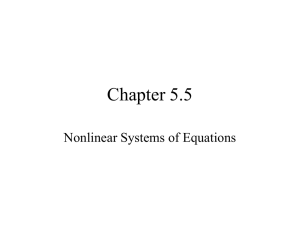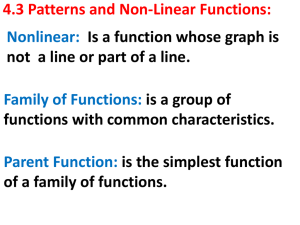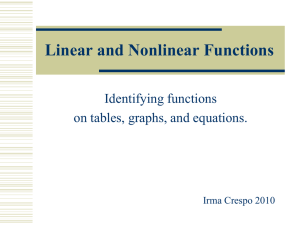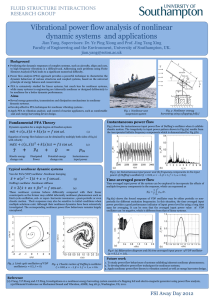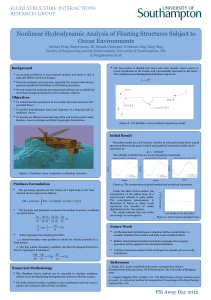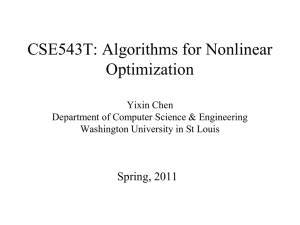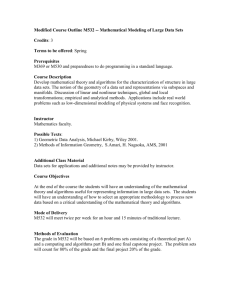Tanh-Coth Method for Nonlinear Differential Equations
advertisement
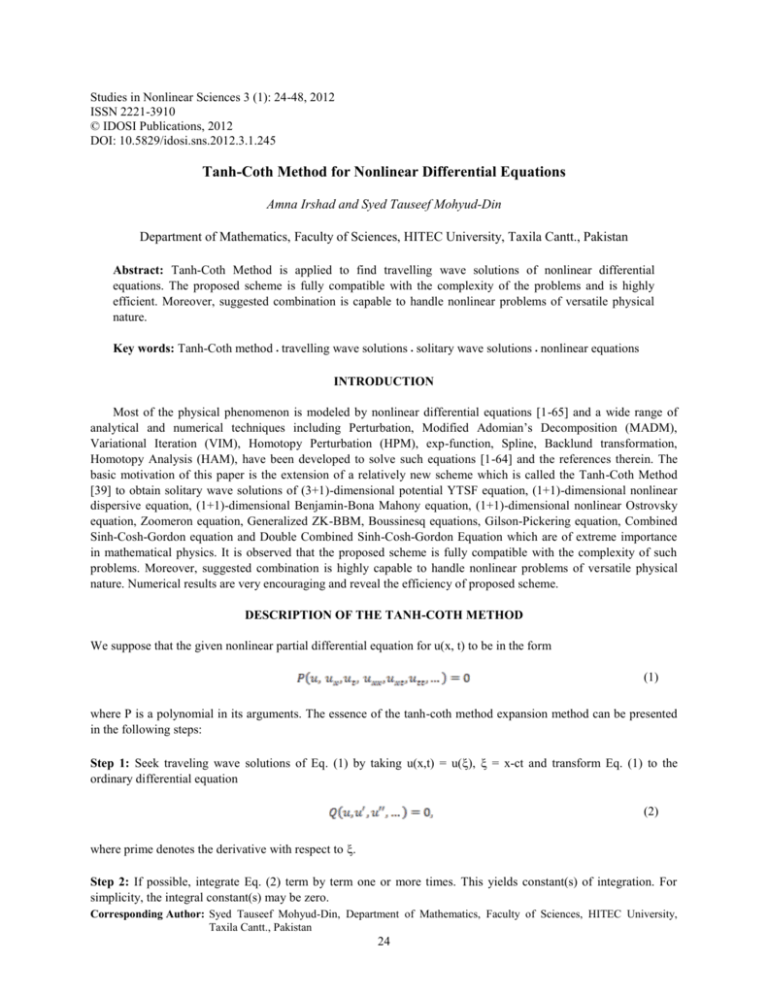
Studies in Nonlinear Sciences 3 (1): 24-48, 2012 ISSN 2221-3910 © IDOSI Publications, 2012 DOI: 10.5829/idosi.sns.2012.3.1.245 Tanh-Coth Method for Nonlinear Differential Equations Amna Irshad and Syed Tauseef Mohyud-Din Department of Mathematics, Faculty of Sciences, HITEC University, Taxila Cantt., Pakistan Abstract: Tanh-Coth Method is applied to find travelling wave solutions of nonlinear differential equations. The proposed scheme is fully compatible with the complexity of the problems and is highly efficient. Moreover, suggested combination is capable to handle nonlinear problems of versatile physical nature. Key words: Tanh-Coth method travelling wave solutions solitary wave solutions nonlinear equations INTRODUCTION Most of the physical phenomenon is modeled by nonlinear differential equations [1-65] and a wide range of analytical and numerical techniques including Perturbation, Modified Adomian’s Decomposition (MADM), Variational Iteration (VIM), Homotopy Perturbation (HPM), exp-function, Spline, Backlund transformation, Homotopy Analysis (HAM), have been developed to solve such equations [1-64] and the references therein. The basic motivation of this paper is the extension of a relatively new scheme which is called the Tanh-Coth Method [39] to obtain solitary wave solutions of (3+1)-dimensional potential YTSF equation, (1+1)-dimensional nonlinear dispersive equation, (1+1)-dimensional Benjamin-Bona Mahony equation, (1+1)-dimensional nonlinear Ostrovsky equation, Zoomeron equation, Generalized ZK-BBM, Boussinesq equations, Gilson-Pickering equation, Combined Sinh-Cosh-Gordon equation and Double Combined Sinh-Cosh-Gordon Equation which are of extreme importance in mathematical physics. It is observed that the proposed scheme is fully compatible with the complexity of such problems. Moreover, suggested combination is highly capable to handle nonlinear problems of versatile physical nature. Numerical results are very encouraging and reveal the efficiency of proposed scheme. DESCRIPTION OF THE TANH-COTH METHOD We suppose that the given nonlinear partial differential equation for u(x, t) to be in the form (1) where P is a polynomial in its arguments. The essence of the tanh-coth method expansion method can be presented in the following steps: Step 1: Seek traveling wave solutions of Eq. (1) by taking u(x,t) = u(), = x-ct and transform Eq. (1) to the ordinary differential equation (2) where prime denotes the derivative with respect to . Step 2: If possible, integrate Eq. (2) term by term one or more times. This yields constant(s) of integration. For simplicity, the integral constant(s) may be zero. Corresponding Author: Syed Tauseef Mohyud-Din, Department of Mathematics, Faculty of Sciences, HITEC University, Taxila Cantt., Pakistan 24 Studies in Nonlinear Sci., 3 (1): 24-48, 2012 Step 3: Introduce a new independent variable (3) that leads to the change of derivatives: (4) Other derivatives can be derived in a similar manner. Step 4: We then propose the following finite series expansion (5) in which in most cases m is a positive integer. To determine the parameter m, we usually balance the linear terms of highest order in the equation (2) with the highest order nonlinear terms. Substituting (3), (4) and (5) into the ODE yields an equation in powers of Y. Step 5: With m determined, we collect all coefficients of powers of Y in the resulting equation where these coefficients have to vanish. This will give a system of algebraic equations involving the parameters a k, bk, µ, c. Having determined these parameters and using (5) we obtain an analytic solution u = u(x,t), in a closed form. SOLUTION PROCEDURE To illustrate the effectiveness and the advantages of the proposed method, Here, we consider two models of nonlinear evolution equations of special interest physically, namely, The (3+1)-dimensional potential YTSF equation. Example 3.1: Consider the (3+1)-dimensional potential YTSF equation (6) Following the above procedure we transform Eq. (6) into (7) obtained upon using = x+y+z-ct and integrating once. Balancing the nonlinear term (u)2 with the highest order derivative u that gives (m+1)2 = m+3 (8) so that m = 1,-2 Case (i): For m = 1, The tanh-coth method admits the use of the substitution (9) (10) 25 Studies in Nonlinear Sci., 3 (1): 24-48, 2012 Substituting (10) into (7), collecting the coefficients of each power of Yi, 0i4, setting each coefficient to zero and solving the resulting system of algebraic equations, we find the following sets of solutions: (11) (12) This in turn gives the front wave (kink) solution (13) And the travelling wave solutions (14) Fig. 3.1: Kink solution of Eq. (13) when a0 = 1, c =-1.5 Fig. 3.2: Travelling wave solution of Eq. (14) when a 0 = 1, c =-1.5 26 Studies in Nonlinear Sci., 3 (1): 24-48, 2012 Case (ii): For m =-2, The tanh-coth method admits the use of the substitution (16) Substituting (16) into (7) and proceeding as before we found that a 2 = b2 = 0. Therefore the substitution (16) is reduced to ) (17) Collecting the coefficients of each power of Yi, 0i8, setting each coefficient to zero and solving the resulting system of algebraic equations, we find the following sets of solutions: (18) (19) (20) (21) This in turn gives the following solution c>0 (22) (23) Fig. 3.3: Traveling wave solution of Eq. (22) when c =-2 27 Studies in Nonlinear Sci., 3 (1): 24-48, 2012 Fig. 3.4: Traveling wave solution of Eq. (23) when c =-2 (24) (25) Example 3.2: Consider the following (1+1)-dimensional nonlinear dispersive equation: (6a) where is nonzero positive constant. This equation is called the modified KdV equation, which arises in the process of understanding the role of nonlinear dispersive and in the formation of structures like liquid drops and it is exhibits compaction: solitons with compact support. Following the above procedure we transform Eq. (6a) into ODE (7a) obtained upon using = x-ct and integrating once. Balancing the nonlinear term u3 with the highest order derivative u that gives 3m = m+2 (8a) m=1 (9a) so that The tanh-coth method admits the use of the substitution (10a) Substituting (10a) into (7a), collecting the coefficients of each power of Y, setting each coefficient to zero and solving the resulting system of algebraic equations, we find the following sets of solutions: 28 Studies in Nonlinear Sci., 3 (1): 24-48, 2012 (11a) (12a) (13a) This in turn gives the front wave (kink) solution (14a) Fig. 3.5: Kink solution of Eq. (14a) when = 0.5, c =-1.5 Fig. 3.6: Travelling wave solution of Eq. (15a) when = 0.5, c =-1.5 29 Studies in Nonlinear Sci., 3 (1): 24-48, 2012 Fig. 3.7: Travelling wave solution of Eq. (16a) when = 0.5, c = 0.5 and the travelling wave solutions (15a) For c>0, we obtain the solution (16a) Example 3.3: Consider the following (1+1)-dimensional Benjamin-Bona Mahony equation (6b) where is nonzero positive constant. This equation was first derived to describe an approximation for surface long waves in nonlinear media. It can also be characterize the hydromagnetic waves in cold plasma, a caustic waves in inharmonic crystals and acostic-gravity waves in compressible fluids. Following the above procedure we transform Eq. (6b) into ODE (7b) obtained upon using = x-ct and integrating once. Balancing the nonlinear term u3 with the highest order derivative u that gives 3m = m+2 (8b) so that m=1 (9b) The tanh-coth method admits the use of the substitution (10b) Substituting (10b) into (7b), collecting the coefficients of each power of Y, setting each coefficient to zero and solving the resulting system of algebraic equations, we find the following sets of solutions: 30 Studies in Nonlinear Sci., 3 (1): 24-48, 2012 (11b) (12b) This in turn gives the front wave (kink) solution (13b) And the travelling wave solutions (13b) Fig. 3.8: Kink solution of Eq. (12b) when = 0.5, c =-1.5 Fig. 3.9: Travelling wave solution of Eq. (13b) when = 0.5, c =-0.5 31 Studies in Nonlinear Sci., 3 (1): 24-48, 2012 Example 3.4: Consider the (1+1)-dimensional nonlinear Ostrovsky equation (6c) This equation is a model for weakly nonlinear surface and internal waves in a rotation ocean. Following the above procedure we transform Eq. (6c) into ODE: (7c) obtained upon using = x-ct. Integrating Eq.(7c) with respect to one has (8c) Balancing the nonlinear term u3 with the highest order derivative uu that gives 3m = m+m+2 (9c) m=2 (10c) so that The tanh-coth method admits the use of the substitution (11c) Substituting (11c) into (8c), collecting the coefficients of each power of Y, setting each coefficient to zero and solving the resulting system of algebraic equations, we find the following solution set (12c) This in turn gives the solution (13c) Fig. 3.10: Solitary wave solution of Eq. (13c) when µ = 0.5, c = 1.5 32 Studies in Nonlinear Sci., 3 (1): 24-48, 2012 Example 3.5: Now we will consider Zoomeron equation (6d) We would like to use our method to obtain more general exact solutions of Eq. (6d) by assuming the solution in the following frame: (7d) where c, are constants. We substitute Eq. (7d) into Eq. (6d) and integrating twice with respect to , by setting the second integration constant equal to zero, we obtain the following nonlinear ordinary differential equation (8d) where R is integration constant. Balancing the nonlinear term U3 with the highest order derivative U that gives 3m = m+2 (9d) m=1 (10d) so that The tanh-coth method admits the use of the substitution (11d) Substituting (11d) into (8), collecting the coefficients of each power of Y, setting each coefficient to zero and solving the resulting system of algebraic equations, we find the following sets of solutions: (12d) (13d) (14d) This in turn gives the front wave (kink) solution (15d) And the travelling wave solutions (16d) For c>0, we obtain the solution (17d) 33 Studies in Nonlinear Sci., 3 (1): 24-48, 2012 Fig. 3.11: Kink solution of Eq. (15d) when R = 0.5, c =-1.5, = 1 Fig. 3.12: Travelling wave solution of Eq. (16d) when R = 0.5, c =-1.5, = 1 Fig. 3.13: Travelling wave solution of Eq. (17d) when R = 0.5, c =-1.5, = 1 34 Studies in Nonlinear Sci., 3 (1): 24-48, 2012 Example 3.6: Consider the following Generalized ZK-BBM Equation (6e) Following the above procedure we transform Eq. (6) into ODE (7e) obtained upon using = x+y-ct and integrating once. Balancing the nonlinear term u3 with the highest order derivative u that gives 3m = m+2 (8e) m=1 (9e) so that The tanh-coth method admits the use of the substitution (10e) Substituting (10e) into (7e), collecting the coefficients of each power of Y, setting each coefficient to zero and solving the resulting system of algebraic equations, we find the following sets of solutions: (11e) (12e) This in turn gives the front wave (kink) solution (13e) And the travelling wave solutions (14e) Fig. 3.14: Kink solution of Eq. (13e) when a = 3.5, c = 1.5, b = 5.5 35 Studies in Nonlinear Sci., 3 (1): 24-48, 2012 Fig. 3.15: Travelling wave solution of Eq. (14e) when a = 5.5, c = 2.5, b = 2.5 Example 3.7: Consider the following Boussinesq equation (6f) where and are positive constants. Eq. (6f) was introduced by Boussinesq in 1871 to describe the propagation of long waves in shallow water. The Boussinesq equation also arises in many other physical applications including nonlinear lattice waves, vibrations on a nonlinear string and ion sound waves in plasma. Following the above procedure we transform Eq. (6f) into ODE (7f) obtained upon using = x-ct and integrating twice. Balancing the nonlinear term u2 with the highest order derivative u that gives 2m = m+2 (8f) m=2 (9f) so that The tanh-coth method admits the use of the substitution (10f) Substituting (10f) into (7f), collecting the coefficients of each power of Y, setting each coefficient to zero and solving the resulting system of algebraic equations, we find the following sets of solutions: (11f) (12f) (13f) 36 Studies in Nonlinear Sci., 3 (1): 24-48, 2012 (14f) In view of these results we obtain the following sets of solutions (15f) (16f) (17f) (18f) Fig. 3.16: Solitary wave solutionof Eq. (15f) when = 1.75, c = 1.5, = 0.5 Fig. 3.17: Travelling wave solution of Eq. (16f) when = 3.75, c = 5.5, = 2.5 37 Studies in Nonlinear Sci., 3 (1): 24-48, 2012 Fig. 3.18: Graph of Eq. (17f) when = 2.75, c =-1.5, = 3.5 Fig. 3.19: Graph of Eq. (18f) when = 0.75, c = 0.5, =-0.5 Example 3.8: Consider the following Gilson-Pickering equation, (6g) where ,k,, are arbitrary constants. The equation was introduced by Gilson and Pickering (GP) in 1995 and was called the Gilson-Pickering equation,The solutions for = 1, were studied. Our results are corresponding to = -2. Three special cases of Eq. (6g) have appeared in the literature. Up to some rescalings, these are:the FornbergWhitham (FW) equation, the Rosenau-Hyma (RH) equation, the Fuchssteiner-Fokas-Camassa-Holm (CH) equation. We would like to use our method to obtain more general exact solutions of Eq. (6g) by assuming the solution in the following frame: u = U(), = x-ct (7g) where c is a constants. We substitute Eq. (7g) into Eq. (6g) and integrating twice with respect to , by setting the second integration constant equal to zero, we obtain the following nonlinear ordinary differential equation 38 Studies in Nonlinear Sci., 3 (1): 24-48, 2012 (8g) Balancing the nonlinear term u2 with the highest order derivative u that gives 2m = m+2 (9g) m=2 (10g) so that The tanh-coth method admits the use of the substitution (11g) Substituting (11g) into (8g), collecting the coefficients of each power of Y, setting each coefficient to zero and solving the resulting system of algebraic equations, we find the following sets of solutions: (12g) (13g) (14g) (15g) In view of these results we obtain the following sets of solutions (16g) (17g) (18g) (19g) 39 Studies in Nonlinear Sci., 3 (1): 24-48, 2012 Fig. 3.20: Solitary wave of Eq. (16g) when = 1.75, c =-0.5, = 1.5, k = 1.5 Fig. 3.21: Travelling wave of Eq. (17g) when = 0.75, c =-1.5, = 0.5, k = 0.5 Fig. 3.22: Solitary wave of Eq. (18g) when = 2.5, c = 5.5, = 2.5, k = 10 40 Studies in Nonlinear Sci., 3 (1): 24-48, 2012 Fig. 3.23: Travelling wave of Eq. (19g) when = 2, c = 1.5, = 3.75, k = 1.5 Example 3.9: Consider the following Combined Sinh-Cosh-Gordon Equation, We first solve the combined sinhcosh-Gordon equation (6h) where and are nonzero real constants. Making the transformation u(x,t) = u(), = x-ct and integrating once with respect to , Eq. (6h) we get (7h) By applying the Painlev´e transformation, v = eu (8h) u = In v (9h) or equivalently we have (10h) Then (11h) Consequently, we can write the combined sinh-cosh-Gordon equation (7h) to the ODE (12h) Balancing the nonlinear term v3 with the highest order derivative vv that gives m=2 (13h) The tanh-coth method admits the use of the substitution (14h) Substituting (14h) into (12h), collecting the coefficients of each power of Y, setting each coefficient to zero and solving the resulting system of algebraic equations, we find the following sets of solutions: 41 Studies in Nonlinear Sci., 3 (1): 24-48, 2012 (15h) (16h) This in turn gives (17h) and (18h) Recall that (19h) from (11h), we therefore obtain the solutions (20h) (21h) Fig. 3.24: Kink solution of Eq. (17h) when = 4.5, c = 2.5, = 2.5, k = 2.5 42 Studies in Nonlinear Sci., 3 (1): 24-48, 2012 Fig. 3.25: Travelling wave solution of Eq. (18h) when =-9.5, c = 2.5, =-7.5, k = 3.75 Example 3.10: Consider the following double combined sinh-cosh-Gordon equation (6i) where and are nonzero real constants. Making the transformation u(x,t) = u(), = x-ct and integrating once with respect to , we get (7i) Using the transformation, v = eu (8i) u = ln v (9i) or equivalently we have (10i) (11i) Then (12i) Consequently, we can write the double combined sinh-cosh-Gordon equation (7i) to the ODE (13i) Balancing the nonlinear term v4 with the highest order derivative vv that gives m=1 (14i) The tanh-coth method admits the use of the substitution (15i) 43 Studies in Nonlinear Sci., 3 (1): 24-48, 2012 Substituting (15i) into (13i), collecting the coefficients of each power of Y, setting each coefficient to zero and solving the resulting system of algebraic equations, we find the following sets of solutions: (16i) (17i) This in turn gives (18i) and (19i) Fig. 3.26: Kink solution of Eq. (18i) when = 1.5, c = 0.5, = 2.5, k = 0.75 Fig. 3.27: Travelling wave solution of Eq. (19i) when = 1.5, c = 1.5, = 3.5, k = 2.5 44 Studies in Nonlinear Sci., 3 (1): 24-48, 2012 Recall that (20i) from (20i), we therefore obtain the solutions (21i) (22i) Where CONCLUSION The tanh-coth method was successfully used to establish solitary wave solutions. The performance of the tanhcoth method is reliable and effective and gives more solutions. The applied method will be used in further works to establish more entirely new solutions for other kinds of nonlinear wave equations. As we know, various other types of exact solutions for the nonlinear evolution equations, such as rational solutions, polynomial solutions and the traveling wave solutions have been obtained by many authors under different approaches. However, our solutions are soliton and periodic solutions. Soliton and periodic solutions have many potential applications in physics. The availability of computer systems like Mathematica or Maple facilitates the tedious algebraic calculations. The method which we have proposed in this letter is also a standard, direct and computerizable method, which allows us to solve complicated and tedious algebraic calculation. REFERENCES Abbasbandy, S., 2007. A new application of He’s variational iteration method for quadratic Riccati differential equation by using Adomian’s polynomials. J. Comput. Appl. Math., 207: 59-63. 2. Abdou, M.A. and A.A. Soliman, 2005. New applications of variational iteration method. Phys. D 211 (1-2): 1-8. 3. He, J.H., 2006. Some asymptotic methods for strongly nonlinear equation. Int. J. Mod. Phys., 20 (20)10: 1144-1199. 4. Rogers, C. and W.F. Shadwick, 1982. Backlund transformations. Aca. Press, New York. 5. Ablowitz, M.J. and P.A. Clarkson, 1991. Solitons, nonlinear evolution equations and inverse scattering transform. Cambridge Univ. Press, Cambridge. 6. Zhang, J., D. Zhang and D. Chen, 2011. Exact solutions to a mixed Toda lattice hierarchy through the inverse scattering transform. Journal of Physics A: Mathematical and Theoritical, doi: 10.1088/17518113/44/11/115201. 7. Liu, S., Z. Fu, S. Liu and Q. Zhao, 2001. Jacobi elliptic function expansion method and periodic wave solutions of nonlinear wave equations. Physics Letters A, 289: 69-74. 8. Al-Muhiameed, Z.I.A. and E.A.B. Abdel-Salam, 2011. Generalized Jacobi elliptic function solution to a class of nonlinear Schrodinger-type equations. Mathematical Problems in Engineering, Article ID 575679, doi:10.1155/2010/575679, 2011: 11. 9. Malfliet, W., 1992. Solitary wave solutions of nonlinear wave equations. Am. J. Phys., 60: 650-654. 10. Wazwaz, A.M., 2007. The tanh-coth method for solitons and kink solutions for nonlinear parabolic equations. Applied Mathematics and Computation, 188: 1467-1475. 11. Gomez, C.A. and A.H. Salas, 2010. Exact solutions for the generalized BBM equation with variable coefficients. Mathematical Problems in Engineering, Article ID 498249, doi:10.1155/2010/498249, 2010: 10. 12. Hirota, R., 1971. Exact solution of the KdV equation for multiple collisions of solutions. Physics Review Letters, 27: 1192-1194. 45 1. Studies in Nonlinear Sci., 3 (1): 24-48, 2012 13. Soliman, A.A. and H.A. Abdo, 2009. New exact Solutions of nonlinear variants of the RLW, the PHI-four and Boussinesq equations based on modified extended direct algebraic method. International Journal of Nonlinear Science, 7 (3): 274-282. 14. Salas, A.H. and C.A. Gomez, 2010. Application of the Cole-Hopf transformation for finding exact solutions to several forms of the seventh-order KdV equation. Mathematical Problems in Engineering, Article ID 194329, doi: 10.1155/2010/194329, 2010: 14. 15. He, H. and X.H. Wu, 2006. Exp-function method for nonlinear wave equations. Chaos Solitons and Fractals, 30: 700-708. 16. Naher, H., F. Abdullah and M.A. Akbar, 2011. New travelling wave solutions of the higher dimensional nonlinear partial differential equation by the Exp-function method. Journal of Applied Mathematics (Article ID: 575387, In Press). 17. Mohyud-din, S.T., M.A. Noor and K.I. Noor, 2010. Exp-function method for traveling wave solutions of modified Zakharov-Kuznetsov equation. Journal of King Saud University, 22: 213-216. 18. Naher, H., F. Abdullah and M.A. Akbar, 2011. The exp-function method for new exact solutions of the nonlinear partial differential equations. International Journal of the Physical Sciences, 6 (29): 6706-6716. 19. Yildirim, A. and Z. Pinar, 2010. Application of the exp-function method for solving nonlinear reaction-diffusion equations arising in mathematical biology. Computers & Mathematics with Applications, 60: 1873-1880. 20. Aslan, I., 2011. Application of the exp-function method to nonlinear lattice differential equations for multiwave and rational solutions. Mathematical Methods in the Applied Sciences, Doi: 10.1002/mma.1476. 21. Bekir, A. and A. Boz, 2008. Exact solutions for nonlinear evolution equations using Exp-function method. Phys. Letters A, 372: 1619-1625. 22. Wazwaz, A.M., 2011. A new (2+1)-dimensional Korteweg-de-Vries equation and its extension to a new (3+1)dimensional Kadomtsev-Petviashvili equation. Physica Scripta, doi:10.1088/0031-8949/84/03/035010. 23. Yun, B.I., 2011. An iteration method generating analytical solutions for Blasius problem. Journal of Applied Mathematics, Article ID 925649, doi: 10.1155/2011/925649, 2011: 8. 24. Zhang, S., J. Ba, Y. Sun and L. Dong, 2010. Analytic solutions of a (2+1)-dimensional variable-coefficient Broer-Kaup system. Mathematical Methods in the Applied Sciences, Doi: 10.1002/mma.1343. 25. Salah, F., Z.A. Aziz and D.L.C. Ching, 2011. New exact solutions for MHD transient rotating flow of a secondgrade fluid in a porous medium. Journal of Applied Mathematics, Article ID 823034, doi: 10.1155/2011/823034, 2011: 8. 26. Deakin, A.S. and M. Davison, 2010. Analytic solution for a vasicek interest rate convertible bond model. Journal of Applied Mathematics, Article ID 263451, doi: 10.1155/2010/263451, 2010: 5. 27. Massabo, M., R. Cianci and O. Paladino, 2011. An analytical solution of the advection dispersion equation in a bounded domain and its application to laboratory experiments. Journal of Applied Mathematics, Article ID 493014, doi: 10.1155/2011/493014, 2011: 14. 28. Abou, M.A., 2007. The extended F-expansion method and its applications for a class of nonlinear evolution equation. Chaos, Solitons and Fractals, 31: 95-104. 29. Wang, M., X. Li and J. Zhang, 2008. The (G/G)-expansion method and travelling wave solutions of nonlinear evolution equations in mathematical physics. Physics Letters A, 372: 417-423. 30. Ozis, T. and I. Aslan, 2010. Application of the (G/G)-expansion method to Kawahara type equations using symbolic computation. Applied Mathematics and Computation, 216: 2360-2365. 31. Gepreel, K.A., 2011. Exact solutions for nonlinear PDEs with the variable coefficients in mathematical physics. Journal of Information and Computing Science, 6 (1): 003-014. 32. Zayed, E.M.E. and S. Al-Joudi, 2010. Applications of an Extended (G/G)-Expansion Method to Find Exact Solutions of Nonlinear PDEs in Mathematical Physics. Mathematical Problems in Engineering, Article ID 768573, doi:10.1155/2010/768573, 2010: 19. 33. Naher, H., F. Abdullah and M.A. Akbar, 2011. The (G/G)-expansion method for abundant traveling wave solutions of Caudrey-Dodd-Gibbon equation. Mathematical Problems in Engineering, Article ID: 218216, doi:10.1155/2011/218216 (In Press), 2011: 11. 34. Feng, J., W. Li and Q. Wan, 2011. Using (G/G)-expansion method to seek traveling wave solution of Kolmogorov-Petrovskii-Piskunov equation. Applied Mathematics and Computation, 217: 5860-5865. 46 Studies in Nonlinear Sci., 3 (1): 24-48, 2012 35. Zhao, Y.M., Y.J. Yang and W. Li, 2011. Application of the improved (G/G)-expansion method for the Variant Boussinesq equations. Applied Mathematical Sciences, 5 (58): 2855-2861. 36. Nofel, T.A., M. Sayed, Y.S. Hamad and S.K. Elagan, 2011. The improved (G/G)-expansion method for solving the fifth-order KdV equation. Ann. Fuzzy Math. Info. xx 1-xx. 37. Zhu, S., 2008. The generalizing Riccati equation mapping method in non-linear evolution equation: application to (2+1)-dimensional Boiti-Leon-Pempinelle equation. Chaos, Solitons and Fractals, 37: 1335-1342. 38. Li, B., Y. Chen, H. Xuan and H. Zhang, 2004. Generalized Riccati equation expansion method and its application to the (3+1)-dimensional Jumbo-Miwa equation. Applied Mathematics and Computation, 152: 581-595. 39. Bekir, A. and A.C. Cevikel, 2011. The tanh-coth method combined with the Riccati equation for solving nonlinear coupled equation in mathematical physics. Journal of King Saud University-Science, 23: 127-132. 40. Guo, S., L. Mei, Y. Zhou and C. Li, 2011. The extended Riccati equation mapping method for variablecoefficient diffusion-reaction and mKdV equation. Applied Mathematics and Computation, 217: 6264-6272. 41. Li, Z. and Z. Dai, 2010. Abundant new exact solutions for the (3+1)-dimensional Jimbo-Miwa equation. Journal of Mathematical Analysis and Applications, 361: 587-590. 42. Salas, A., 2008. Some exact solutions for the Caudrey-Dodd-Gibbon equation. arXiv: 0805.2969v2 [math-ph]. 43. Salas, A., 2008. Some solutions for a type of generalized Sawada-kotera equation. Applied Mathematics and Computation, 196: 812-817. 44. Liu, X.. L. Tian and Y. Wu, 2010. Application of (G/G)-expansion method to two nonlinear evolution equations. Applied Mathematics and Computation, 217: 1376-1384. 45. Ma, W.X. and Y. You, 2004. Solving the Korteweg-de Vries equation by its bilinear form: Wronskian solutions. Transactions of the American Mathematical Society, 357: 1753-1778. 46. Ma, W.X. and Y. You, 2004. Rational solutions of the Toda lattice equation in Casoratian form, Chaos, Solitons & Fractals, 22: 395-406. 47. Ma, W.X., C.X. Li and J.S. He, 2008. A second Wronskian formulation of the Boussinesq equation. Nonlin. Anl. Th. Meth. Appl., 70 (12): 4245-4258. 48. Ma, W.X., 2009. Variational identities and applications to Hamiltonian structures of soliton equations. Nonlin. Anal., DOI:10.1016/j.na. 2009.02.045. 49. Ma, W.X., J.S. He and Z.Y. Qin, 2008. A supertrace identity and its applications to super integrable systems. J. Math. Phys., 49: 033522, 13 pp. 50. Ma, W.X. and R.G. Zhou, 2001. Nonlinearization of spectral problems for the perturbation KdV systems. Phys. A, 296: 60-74. 51. Ma, W.X. and M. Chen, 2006. Hamiltonian and quasi-Hamiltonian structures associated with semi-direct sums of Lie algebras. J. Phys. A: Math. Gen., 39: 10787-10801. 52. Ma, W.X., 1993. The algebraic structures of zero curvatures representation and applications to coupled KdV systems. J. Phys. A: Math. Gen., 26: 2573-2582. 53. Ma, W.X., 1992. An approach for constructing nonisospectral hierarchies of evolution equations. J. Phys. A: Math. Gen., 25: L719-L726. 54. Ma, W.X., 2002. Complexiton solutions to the Korteweg-de Vires equation. Phys. Lett. A 301: 35-44. 55. Ma, W.X. and K. Maruno, 2004. Complexiton solutions of the Toda lattice equation. Phys. A 343: 219-237. 56. Ma, W.X. and D.T. Zhou, 1997. Explicit exact solution of a generalized KdV equation. Acta Math. Scita., 17: 168-174. 57. Ma, W.X. and B. Fuchssteiner, 1996. Explicit and exact solutions of Kolmogorov-PetrovskII-Piskunov equation. Int. J. Nonlin. Mech., 31 (3): 329-338. 58. Ma, W.X., H.Y. Wu and J.S. He, 2007. Partial differential equations possessing Frobenius integrable decompositions. Phys. Lett. A, 364: 29-32. 59. Ma, W.X., 2008. An application of the Casoratian technique to the 2D Toda lattices equation. Mod. Phys. Lett. B, 22: 1815-1825. 60. Yildirim, A. and S.T. Mohyud-Din, 2010. Analytical approach to space and time fractional Burger’s equations. Chinese Physics Letters, 27 (9): 090501. 61. Mohyud-Din, S.T., 2010. Variational iteration techniques for boundary value problems. VDM Verlag, ISBN 978-3-639-27664-0. 47 Studies in Nonlinear Sci., 3 (1): 24-48, 2012 62. Noor, M.A. and S.T. Mohyud-Din, 2008. Variational iteration method for solving higher-order nonlinear boundary value problems using He’s polynomials. International Journal of Nonlinear Sciences and Numerical Simulation, 9 (2): 141-157. 63. Mohyud-Din, S.T., M.A. Noor and K.I. Noor, 2009. Travelling wave solutions of seventh-order generalized KdV equations using He’s polynomials. International Journal of Nonlinear Sciences and Numerical Simulation, 10 (2): 223-229. 64. Mohyud-Din, S.T., M.A. Noor, K.I. Noor and M.M. Hosseini, 2010. Solution of singular equations by He’s variational iteration method. International Journal of Nonlinear Sciences and Numerical Simulation, 11 (2): 81-86. 65. Wazwaz, A.M., 2012. Two kinds of multiple wave solutions for the potential YTSF equation and a potential YTSF-type equation. Journal of Applied Nonlinear Dynamics, 1 (1): 51-58. 48

